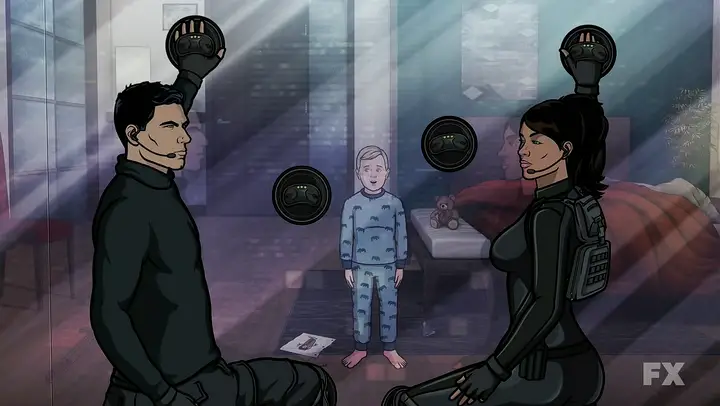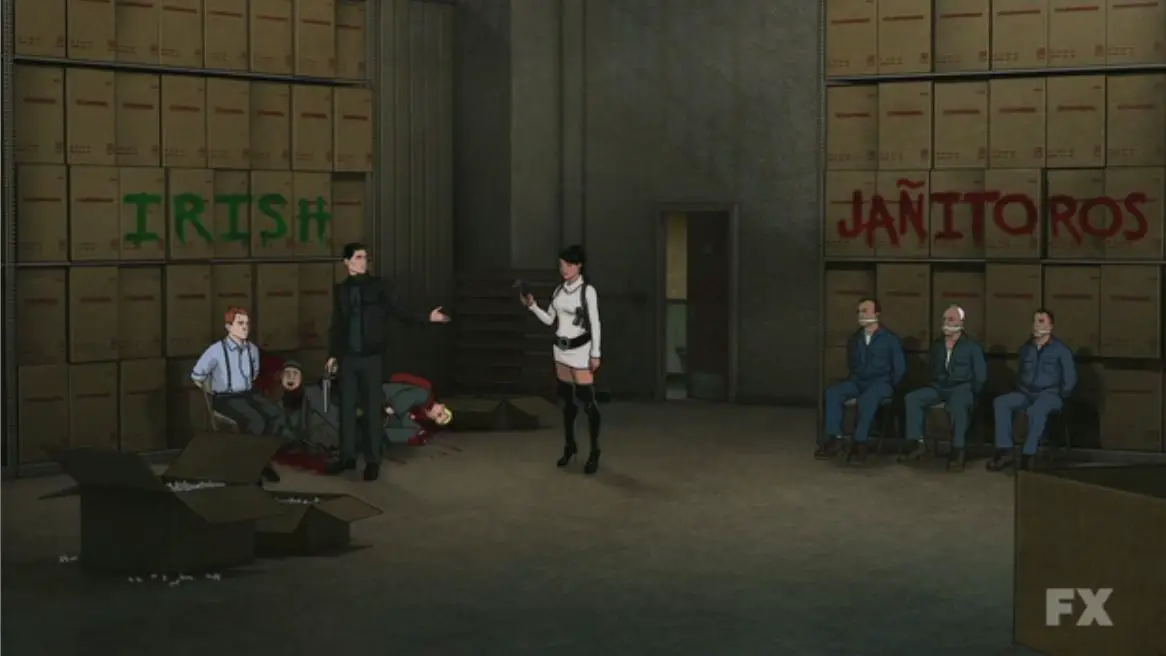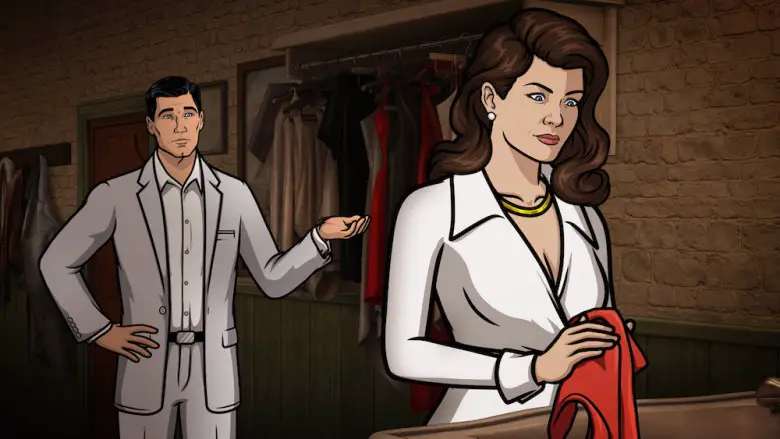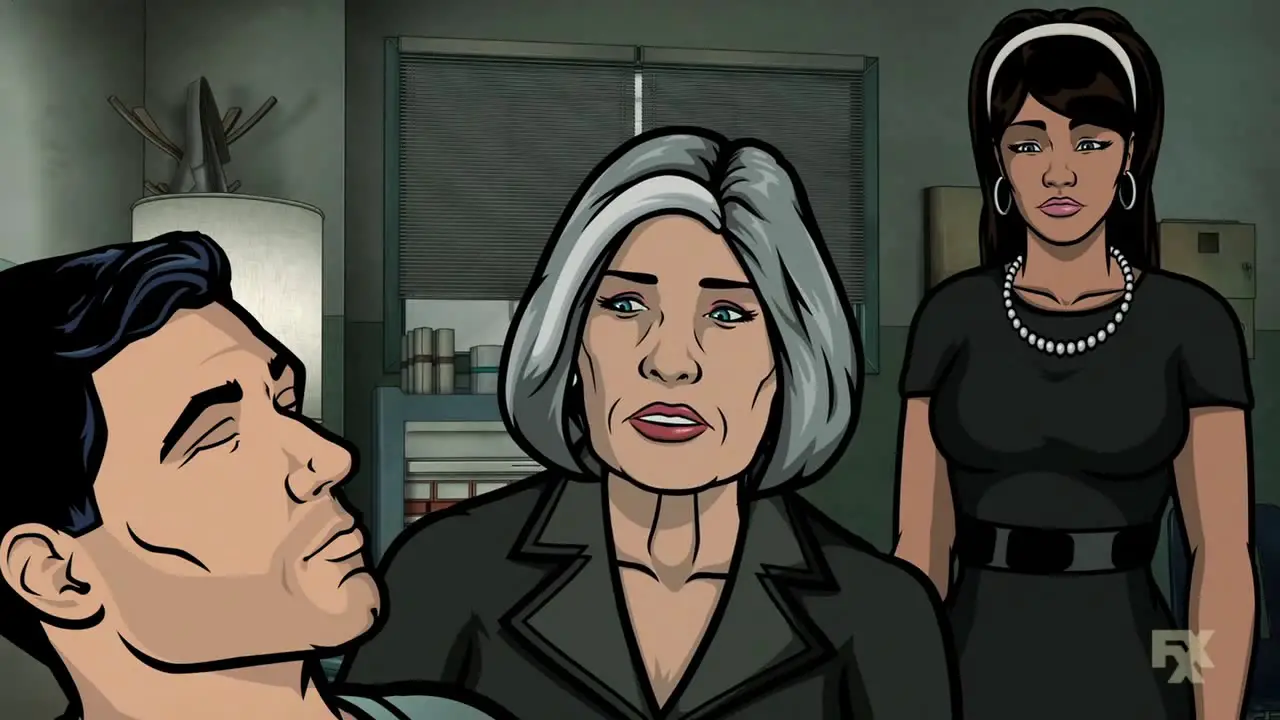From espionage, sex and drinking to electric bum fights and ocelots, the adult comedy show “Archer” really does have it all, making it no surprise it has continued into its ninth season. What is surprising, however, is how this current season and the one before it are drastically different from the show fans have come to love.
With talks of the animated series extending beyond Season 10, potentially killing off the title character for good and continuing without him, it’s worth asking if “Archer” can successfully evolve into an entirely different but equally successful show.
By examining episodes from the first four seasons and comparing them to later seasons, it becomes possible to track this process of transition and determine what makes up the show’s identity in the first place.
The World’s Deadliest Spy
The seventh episode of the first season, “Skytanic,” really highlights how well the comedy works when the show uses the spy world as the backdrop for its shenanigans. At the start of the episode, Archer doesn’t want to take a mission to investigate a bomb threat on a blimp — not for any particular reason, but because he simply doesn’t want to.
It’s completely common to see television characters loathe going to work, but that work is usually mundane office or factory work, not thwarting an attack on a luxurious blimp. Seeing the main character not wanting to do their job isn’t as funny as seeing the main character not wanting to do this job, especially when considering that no one can reluctantly become a spy like they can an office worker.
Archer ends up taking the mission once he learns his coworker and love interest, Lana, will be sharing a small room with him. You would expect any secret agent worth their salt would remain discreet and attract as little attention as possible — enter Sterling Archer, who ends up smacking a man about to light a cigar because he believes helium is flammable (which it isn’t, and this point was made clear in the debriefing at the start of the episode).
Slapping a random man is funny enough on its own, but when a random man is slapped because a secret agent failed to understand simple science, the comedy of the situation is greatly elevated.
Throw in some unwarranted profiling, a loose use of the NATO phonetic alphabet (‘M’ as in “Mancy” is timeless) and more misunderstanding of how helium works, and you get an excellent episode of “Archer” that could only exist in the world of espionage.
The Power Couple

On the surface, Sterling Archer is an extremely handsome man who exudes charm and confidence, but beneath that suave exterior is a self-absorbed alcoholic with entitlement and mommy issues.
Someone would have to be their own brand of crazy to put up with Archer more than was necessary — and that’s where Lana Kane comes in, complete with insecurity issues, controlling tendencies and oversized meat blobs at the ends of her arms masquerading as hands.
Seeing these two as an on-and-off-but-mostly-off couple makes for entertaining television, and the ninth episode in Season 4, “The Honeymooners,” is a prime example. The couple poses as newlyweds to stop North Koreans from purchasing parts to a nuclear bomb, and while Archer is enjoying it more than he should be, Lana isn’t enjoying it at all (which may be a little over the top on her part as well).
Archer goes deep undercover by buying expensive items off the dinner menu and relaxing in a hot tub because North Korea is “the nation-state equivalent of the short bus.” Lana actually does her job, keeping surveillance on the North Koreans in the hotel.
Archer stays committed to his role and hangs back to get a thorough manicure while Lana goes out to do the job they were assigned, only joining her after he discovers his bonus has been drastically reduced. Lana is scaling a skyscraper at the time, but that doesn’t stop Archer from climbing up to complain about his bonus.
Moments later, he saves Lana from becoming a splat on the pavement and follows up with a tangent about how saving her life “a gazillion” times means he deserves a bigger bonus. These petty interactions continue until the end of the episode, and even though the couple never settle their differences, they get the job done. The banter between these two is so great it can carry an entire episode.
No Strings Attached
Most episodes in first four seasons follow the agents on their missions, but there are a few episodes mostly or totally unrelated to espionage that turn out just as well.
There’s “Blood Test,” when Archer learns he has had a baby with a hooker and attempts to swap his blood with Cyril’s, the timid accountant who has also dated Lana, to trick the paternity test.
There’s “Lo Scandalo,” in which Archer and the crew help his mother and boss, Malory, cover up the murder of the Italian Prime Minister in her apartment, or “Legs,” which is entirely about sassy field agent Ray getting new biomechanical legs and Archer trying to prevent the surgery out of his fear of cyborgs.

A true standout would be “Stage Two” and its follow-up “Placebo Effect,” which follow Archer’s bout with breast cancer. “Stage Two” is filled to the brim with golden moments, such as: the lethal game of “Family Feud” held between the Irish and Janitoros; Archer taking his chemo mid-rampage; sticking a live grenade up a mobster’s anus; and learning Archer actually made his co-workers watch the recording of his rampage every Friday for three months afterwards.
These episodes make it clear that the cast of “Archer” can be interesting and funny without the superspy overlay, and the showrunners set out to prove that in the show’s fifth season.
“I mean if Mexicans can do it…”
The beginning of Season 5, titled “Archer Vice,” the agency is dissolved by the FBI because, in a rather unsurprising revelation, it was operating entirely without the United States’ supervision. By the end of the opening episode, they have a ton of cocaine to sell, which becomes the plotline of the entire season.
It’s the first time the show invested in a season-long plot arc and, for the most part, it works. “Vice” doesn’t let story progression stop the cast from following tangents and getting into crazy situations that are only loosely centered around the drugs.
The episode “A Debt Of Honor” is about protecting Pam, the HR rep who can’t keep a secret for longer than a few minutes, from the Yakuza after she uses counterfeit money to purchase amphetamines from them. The following episode, “House Call,” sees Archer and the gang hiding the drugs from FBI Agent Holly, while “Baby Shower” focuses on Lana’s baby shower and Archer meeting Kenny Loggins.
Lana spends the season pregnant, Pam becomes addicted to cocaine and the crazy millionaire secretary Cheryl/Carol becomes Cherlene, a country singer whose music will end up going platinum by the end of the season. Even though the season is a sort of spinoff, character development, shallow though it may be, does take place.
“Vice” isn’t perfect, however, the writers over-rely on coked-out Pam jokes, Cherlene’s inclusion and the repeated failures of the main cast to sell the cocaine. It provides for some good laughs here and there, but knowing your protagonist is going to come out on the bottom at the end of each episode becomes annoyingly repetitive.
Overall, “Vice” was “Archer” with a twist, and it did move the show forward. Season 6 has the crew working for the CIA and is tonally much more like the first four, even producing a few gems like “Vision Quest” and “Meet The Kanes.” Things seemed to be back on track, which made the change of direction in the following seasons a bit puzzling.
“Hold on, I had something for this.”
If the weaknesses of “Vice” resulted from foregoing the espionage exploits that defined the show in favor of a season-long plot arc, then Season 7 is significantly weaker.
The most notable change that came to Season 7, one that continues into Seasons 8 and 9, was the number of episodes per season. Season 7 has 10 episodes instead of the usual 13, which seems like it should be a great decision.
In fact, on paper, Season 7 seems like it would be a great season: the gang work for Cyril’s detective agency in Los Angeles, which should allow for refreshing office dynamics and new adventures in the civilian world. Instead, six of the 10 episodes center around a single case involving Veronica Deane, a rather uninteresting movie star who primarily drives as a wedge between Archer and Lana.

Of the four episodes unrelated to the case, two are pretty darn good. There’s “Deadly Prep,” which sees Archer run into his childhood bullies while trying to get his daughter Abbiejean enrolled in a prestigious preschool, and “Motherless Child” is about Archer finding out who is the mother of his cyborg arch-nemesis, Barry. The other two have some highlights but are mostly forgettable, and that severely hurts the shortened season.
There are only two noteworthy things about Season 7: Archer falls into a coma in the finale and, despite all its shortcomings, the season is still enjoyable to watch. It’s these two points that lead fans in the direction of Seasons 8 and 9 while bringing up the question of the future of “Archer” and whether it can become a completely different and be of the same caliber as earlier seasons.
It Was Just A Dream
The eighth season is titled “Archer: Dreamland” and takes place in Archer’s mind while he is recovering from his coma. This season is even shorter than previous one, toting only eight episodes, which may have been for the best — this season is utterly boring and uneventful by “Archer” standards.
The characters fans have come to love are completely different people who barely know one another, so the season lacks the show’s typical engaging banter. It may all take place in a dream, but the writers don’t take advantage of that by giving the audience any moments of lucidity or an update of what’s happening on the outside.
The most fun to be had this season comes from analyzing how Archer views his friends based on their dream incarnations. This season isn’t “Archer” with a noir twist, but rather a neo-noir show loosely interpreting “Archer” characters.
The ongoing ninth season, “Archer: Danger Island,” has a lighter tone and takes place on a tropical island, but it also occurs within a dream. So far, the writers show no signs of exiting the dream anytime soon, not even choosing to toy with it.
The show has clearly gone off the rails and seems to have no chance of redemption, right? Well, that criticism uses the standards set by previous seasons as its basis, but what happens if the show chooses to commit to a new ideal?
Danger Zone

The latest seasons of “Archer” fall short because they fail to check the boxes created by previous seasons. The plot lines tend to leave less room for episodes that aren’t plot-driven, creating fewer memorable moments and spending multiple episodes in a repetitious group of locations.
The reset of the characters undoes seasons’ worth of development, taking the personal sting out of any banter. In early seasons, Lana usually ends up bringing the best lines out of the people around her (the hand jokes are always funny), and her sharing the screen with Archer was always engaging. The dream seasons criminally underutilize her, and the show does suffer for it. That being said, objectively, these seasons aren’t bad.
In fact, they’re above average, consistently scoring a 7 or higher on IMDB and Rotten Tomatoes, which is in line with the previous seasons. The show still manages to create engaging worlds, characters and storylines when judged on its own merit, rather than in comparison to previous work. “Dreamland” and “Danger Island” do some solid world building and, if explored for more than a season, both could easily become two separate shows worth watching.
Ultimately, if “Archer” wants to become something more than the animated adult parody of spy thrillers it’s known as, all the loose ends left by the seventh season need to be wrapped up before it can commit to a new setting for more than a single season.
“Archer” lives and dies by its witty dialogue and the writers need to write more of it — constantly resetting the characters doesn’t allow for a rich history to develop between characters, which holds the dialogue back.
The show can be neo-noir, be about finding treasure or be about a detective agency. It could even be a rip-off of “The Office” if it wanted to.
Whether or not the show will survive without Archer remains to be seen, but it is clear that, for any version of the show to be at its best, there must be time for the characters to shine. If that can be done, the future of “Archer” looks very bright indeed.

















